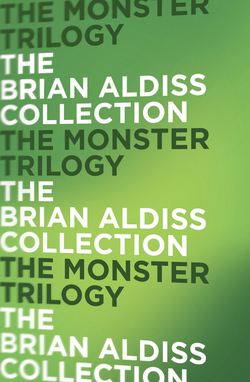Читать книгу The Monster Trilogy - Brian Aldiss - Страница 4
Introduction
ОглавлениеMultitudes of wise men have speculated on what we may call the human predicament. It seems there can be no resolution to the questions: why are we here? Or, what is life?
A long while ago in the seventh century, these questions were pondered on by an old man in a Northumbrian monastery, an old man we remember as the Venerable Bede.
Picture a winter’s night, a draughty hall, reed lights flickering, a good old man wrapped up against the chill.
And this is what he said:
‘O King, seems to me the present life of men on earth, in comparison with that time which to us is uncertain, is as if when on a winter’s night you sit feasting with your ealdormen, and a simple sparrow should fly into the hall. And, coming in at one door, instantly fly out through another. In that time in which it is indoors it is indeed not touched by the fury of the winter; but yet, this smallest piece of calmness being passed almost in a flash, from winter going into winter again, it is lost to our eyes. Somewhat like this appears the life of man, but of what follows or what went before, we are utterly ignorant.’
I wrote a verse on his declaration –
We are such stuff as birds are made of,
Our lives passed in the Halls of the Unknown.
The ancient Bede speaks truth,
A truth indeed we're wise to be afraid of
Before we find our little Day has flown.
Behind this trio of novels lies something much like the bafflement expressed by Bede. What exactly made the teenage Mary Shelley (Mary Wollstonecraft Godwin, as she was then) write her striking novel Frankenstein? What compelled Bram Abraham Stoker (victim as a child of a mysterious illness, personal assistant in adult years to actor Henry Irving and business manager of the Lyceum Theatre) to write the ultimate horror story, Dracula?
And the third writer, H. G. Wells? Wells was a professional writer. He wrote of invading Martians with ‘vast and cold and unsympathetic’ intellects. But what moved him to create the Beast People, beings of our world and yet apart from it?
It remains forever a question of how such matters come about and are born. Perhaps, for these authors, we will never know.
Certainly, these three novels were not written from a great desire of emulation. I was engaged – don’t ask me why – in trying to bring books and stories worth preservation to a new readership. With my staunch friend Harry Harrison, I produced a short-lived critical journal, SF HORIZONS. Perhaps more effectively, Harry and I were also bringing out an annual series of anthologies entitled Best SF on both sides of the Atlantic, which contained visitors such as Fred Hoyle and Franz Kafka.
I ran a two-volume collection of Galactic Empires, while my most ambitious series was published by New English Library, a master science fiction series. That series included writers such as Josef Nesvadba, Frigyes Karinthy, Philip K. Dick, and many others. Each volume carried one of my introductions. I was keeping busy.
Decades later, I have to write this introduction. I am calm, indeed, mild, slouching comfortably at my desk. Pondering the question of how these books came about and were born. What notion was at the heart of the trilogy?
Perhaps the matter is best summarized by Bodenland’s experience in Frankenstein Unbound. He is injured and lost outside Geneva. There had been a storm overnight. Someone has brought him food:
‘It was the smell as much as the taste which convinced me I was still Joe Bodenland, and still destined to struggle on among the living.
‘I was now just impersonally a man, striving against the elements.’
As, of course, many of us have to be and do.
